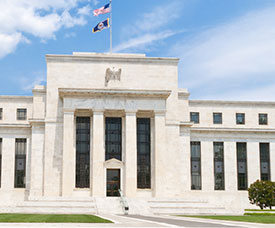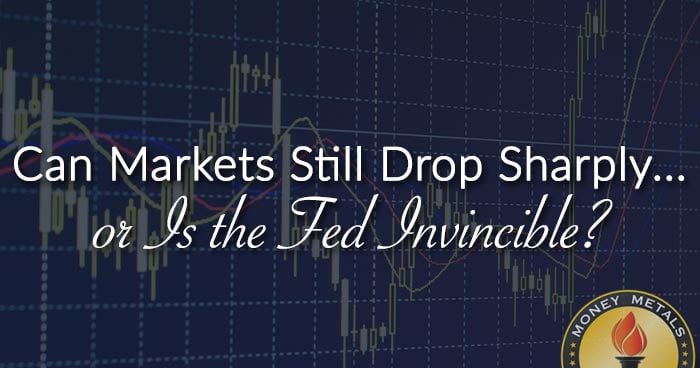The financial markets feel as if they are controlled. Zerohedge recently made an observation that pretty well sums up the situation, in the context of trade: The quickest way to settle the trade war is for stock markets to drop significantly. Much lower prices will put pressure on President Trump to end the standoff.
The problem is neither the president nor the Fed have the stomach for lower prices. Investors are certain they will act quickly to prevent any major bear market.

The term “Fed Put” or “Greenspan Put” was coined more than 20 years ago when Alan Greenspan was Fed Chair. His successors have only become more aggressive when it comes to making sure markets never drop too far, particularly after the 2008 Financial Crisis. Witness the recent about-face by the Fed after the sell-off in stock prices late last year.
Today, one ramification of the Fed’s constant intervention may be a deepening trade war with worsening economic fundamentals – and neither problem will be reflected in stock prices.
All that matters when it comes to stock prices is the Fed won’t allow them to drop. Equity investors sure don’t seem bothered by the fundamentals.
The dislocation related to tariffs is starting to set it in. President Trump just announced $16 billion in aid for farmers devastated by the drop in agricultural exports to China.
GDP growth has often missed expectations and forecasters expect it to slow. Last week’s durable goods orders were a major disappointment.
Geopolitical events, such as rising tensions with Iran and the drama in Europe over Brexit, don’t seem to be budging markets.

Frustrated metals investors wonder if fundamentals will ever matter again.
If the central bank and Trump are going to keep risk (and demand for safe-haven assets) permanently off the table, why bother buying or holding gold?
It is worth examining whether the central planners will ever lose control. They certainly have a lot of firepower at their disposal.
There are indeed some powerful reasons not to “fight the Fed”:
- The Wealth Effect is real. Euphoria accompanies rising 401(k) and home values, and it helps to keep Americans complacent. We are more willing to spend. We are eager to take on debt and less inclined to question whether all of this artificial stimulus is a good idea.
- Low-interest rates do promote borrowing and spending. Americans buy more real estate, automobiles, capital goods, and just about everything else when we can borrow at a low cost to do it.
- Today’s central bankers recognize no limits on their power to intervene. The term “bond vigilante” was created in a prior era of central banking. Back then, nobody considered the possibility the central bank would step in as the buyer of last resort when private-sector bond investors began demanding higher interest rates to compensate for the risk. Today, absolutely nothing is off the table.
As powerful as the Fed may be, it is important to remember a few key points. Fundamentals do matter:
- After all is said and done, simple psychology remains the Achilles’ heel of Fed policy. None of what the bankers are doing works if confidence collapses. The money rolling off the printing press cannot hire people or build factories. Only people who believe the opportunity is now do those things.
- Low-interest rates are a two-edged sword. America is binging on debt, from the consumer level all the way up to the federal government. Housing is increasingly unaffordable, students are finding it difficult to repay the cost of acquiring their degrees, and the federal government will soon spend a trillion dollars a year – all of what it is currently borrowing – just to pay interest on existing debt.
- Fed bankers make mistakes. They are mere humans (with an extra helping of hubris). The Great Depression, the 1970’s stagflation, the Dot Com bubble, and the 2008 Financial Crisis – Fed officials played a leading role in each of these events.
- Black swan events happen and the central planners behind monetary policy are just as surprised as the rest of us when they occur. It is only a matter of time until the next one lays waste to all of their careful planning.
It certainly is aggravating to make well-reasoned investment choices, such as buying gold, and then seemingly get punished for it time and again.
The alternative, however, is to discard reason and assume Jerome Powell and his cohorts have finally figured out how to lead America to the promised land; permanent economic expansion, and a stable dollar.
Reality will ultimately rule over fantasy.

About the Author:
Clint Siegner is a Director at Money Metals Exchange, a precious metals dealer recently named "Best in the USA" by an independent global ratings group. A graduate of Linfield College in Oregon, Siegner puts his experience in business management along with his passion for personal liberty, limited government, and honest money into the development of Money Metals' brand and reach. This includes writing extensively on the bullion markets and their intersection with policy and world affairs.





